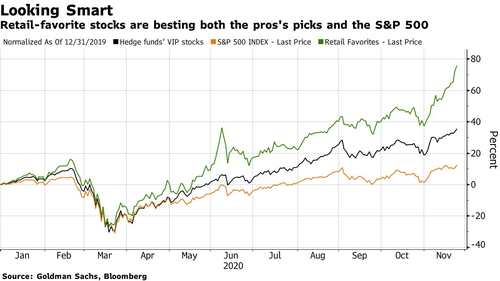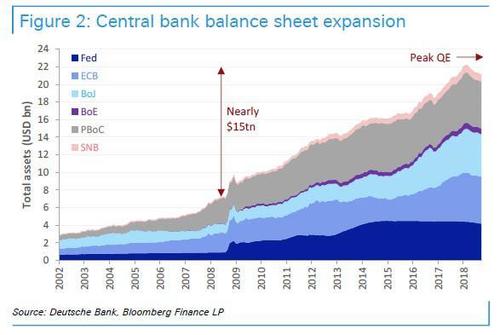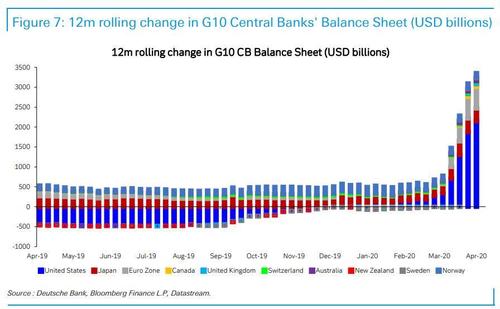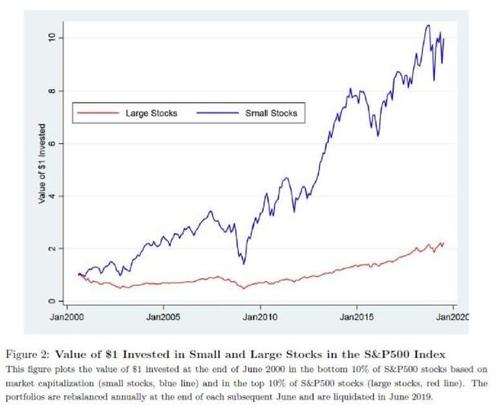Authored by Jim Quinn via The Burning Platform blog,
“The illusion of freedom will continue as long as it’s profitable to continue the illusion. At the point where the illusion becomes too expensive to maintain, they will just take down the scenery, they will pull back the curtains, they will move the tables and chairs out of the way and you will see the brick wall at the back of the theater.” – Frank Zappa
“The choice for mankind lies between freedom and happiness and for the great bulk of mankind, happiness is better.” ― George Orwell, 1984
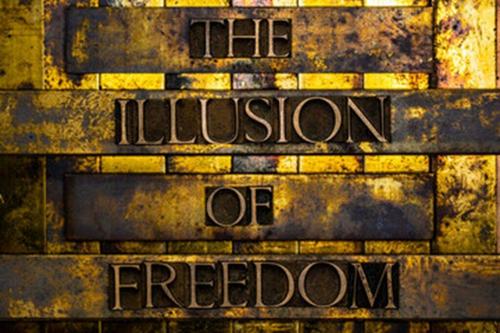
The quote from Frank Zappa has truly come to fruition during the first two weeks of 2021. We have been living in a Surveillance State since the introduction of the Patriot Act in 2001 (Biden has boasted that he wrote the bill years before). Until Snowden and Assange revealed the depth and depravity of this un-Constitutional intrusion into our lives only the Deep State cabal knew the truth.
Most Americans ignored these revelations, as they continued to be distracted and entertained by their iGadgets and new social media platforms like Facebook, Twitter, Instagram, Youtube and others. These social media companies parlayed people’s narcissist need for affirmation, likes and followers into multi-billion-dollar conglomerates with near monopolistic control over the distribution of news, opinions, and on-line communication of the masses.

They have gathered personal data on hundreds of millions, used that data to create an addiction to their platforms, created algorithms to maximize their monetization of you, and colluded with government surveillance agencies to spy on you. The illusion of free speech provided by these Silicon Valley billionaires was extremely profitable for the last couple decades, so now with virtually total control of internet communication, these left-wing oligarchs have conspired with the Deep State traitors, the Democrat party, and the Davos crowd to pull back the curtain and reveal the brick wall at the back of the theater.
They began moving the tables and chairs with the manufactured global pandemic for the Chinese bio-weapon lab virus in March. The psychopaths, who wield the real power, have no concern for humanity. They seized upon this “crisis” to implement a plan to remove Trump through using Covid as an excuse to roll-out a mail-in ballot scheme (supplemented with Dominion voting machine rigging) to commit just enough fraudulent votes to throw the election to basement Biden, a senile bumbling clown who drew tens of tens to his massive rallies.

The social media autocrats gave the first inklings of extinguishing the illusion of freedom as they needed to ramp up the fear and panic from a flu with a 99.7% survival rate, so they began censoring doctors and other dissenters who dared to question the approved narrative of a deadly pandemic requiring mass lockdowns, small business closures (not Wal-Mart or Target) and mandatory masking.
When the effectiveness of Hydroxychloquine + zinc + zpack and Ivermectin were scorned, ridiculed and censored by the social media titans, you knew they were in cahoots with Gates, Fauci and Big Pharma to generate billions in profits rather than save lives. Despite unequivocal proof lockdowns and masks do nothing to stop the spread of a flu that has negligible impact on people under 70, the corporate mainstream media and social media companies promoted falsehoods and censored the truth.
They needed to destroy the economy to remove Trump. The scenery was taken down when the media conglomerates colluded to completely bury the Hunter Biden laptop story and the proof of influence peddling by the Biden crime family with China, Ukraine and Russia, and the Big guy – creepy, sleepy Joe taking his 10% cut. Anyone presenting the facts of these criminal activities was immediately banned, including the NY Post and dozens of other real journalists.
The curtain was inched back on the night of the election and in the weeks thereafter, when their master plan of fraudulent mail-in votes was failing and they needed to stop the counting in all swing states to manufacture more votes to put the senile kid groper over the top. The Silicon Valley authoritarian censorship police went into overdrive, suppressing documented proof of mass fraud, covering up video evidence and hundreds of written affidavits documenting fraud, banning dissenters from their platforms, promoting the false narrative of the fairest election ever, shadow banning opposing viewpoints, placing warnings on the accounts of anyone who presented facts about election fraud, and deleting tweets and Facebook posts of the president.
Biden should have been moving back to his basement, where DOCTOR Jill Biden could feed him oatmeal and wipe the drool off his chin, waiting for dementia to finally consume one of the most corrupt politicians in the history of this country. But instead, on January 20, he will be propped up on stage to be sworn in as president, until his handlers decide to use the 25th Amendment and install the new BJ in Chief – Kamala. The Trojan horse has entered the gates.
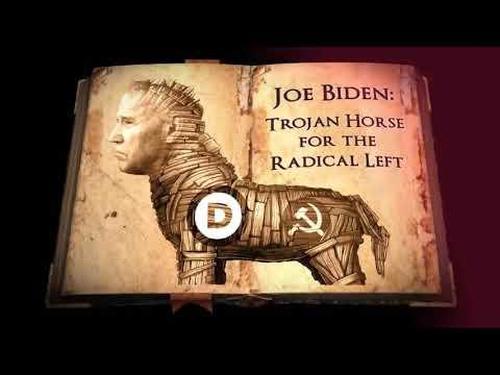
The curtain has been torn down and the tables and chairs tossed aside in the last week, as the social media tyrants have shown their true colors and the four-year collusion cavalcade has reached its illusory climax, with a solid brick wall blocking the exits.
The enemies of the people (aka billionaire oligarchs, Silicon Valley conspirators, corporate fake news media, traitorous Deep State spooks, and corrupt politicians) took advantage of Trump’s failure to comprehend the risk of drawing a few hundred thousand of his most inflamed devotees into Washington on the same day Congress was meeting to confirm the electoral college vote counts, by infiltrating the rally with ANTIFA operatives. Their intent was to paint Trump followers as dangerous domestic terrorists, and the narrative has been propagandized unceasingly by the left.
Trump delivered the standard speech he gave many times during the campaign and specifically told his followers to “peacefully” protest at the Capitol to let our representatives know how they felt about the fraudulent election steal which took place on November 4. There is absolutely nothing he said or did during that speech which can possibly construed as a call for mob violence. He urged the crowd to make their voices heard by the corrupt corporate bought politicians meeting to confirm the stolen election.
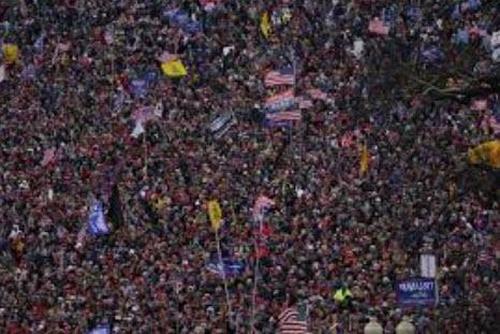
Based upon the hundreds of videos documenting the supposed “insurrectionist” attack mob, it is clear most of the idiots were let into the Capitol by the police, there were numerous ANTIFA thugs creating havoc, none of the insurrectionists had guns, taking selfies, and posing in congressional offices for Facebook posts was the main accomplishment, and one unarmed woman was shot to death by a policeman after being urged to go through a window by BLM leader John Sullivan.
There were a few hundred thousand Trump supporters at the rally and maybe a few hundred who meandered into the Capitol building, broke a few windows, took selfies with policemen, and had five hundred or so corrupt politicians pissing their pants because their constituents are angry about asinine lockdowns and stealing an election through blatant fraud.
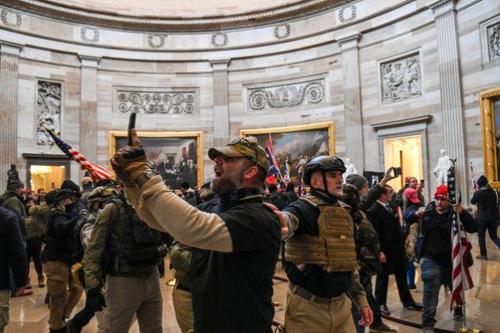
Nothing was burned, there was 99% less violence than any BLM “peaceful protest” over the summer, and the only things looted were Pelosi’s podium and her laptop. She’s probably angry because it had nude selfies, she sent to Fartman Swalwell and Cryin Chuck. This was a perfect setup by those wielding the true power in this country to destroy Trump and brand his 75 million followers with a Scarlet T. They never let an opportunity like this go to waste. AOC and the rest of her squad took to social media to describe the terror of almost dying in this armed insurrection without arms. Maybe they thought they might be gored to death by this paid actor goofball.

Every moment since January 6 has been used by the Big Tech/Big Gov/Big Corp oligarchy to promote the fake news “insurrection” against a government that absconds with your money at gunpoint, uses the U.S. Constitution like toilet paper, is spending future generations into unpayable debt servitude, has as much vision as Ray Charles and the morality of a $2 whore. I apologize to all $2 whores, who at least provide a service. The compliant media mouthpieces were given the script to propagandize the terms “insurrection”, “sedition”, “coup”, and “armed rebellion” for the last two weeks, beating it to death like a clubbed seal.
The Big Lie method is being used by the Goebbels/Bernays acolytes at CNN, MSNBC, and even Fox, as they perpetuate the falsehood of an armed rebellion, when absolutely no one used firearms as they were ushered into the Capitol by police. They have unleashed the rabid dogs in a blatant search and destroy mission to decapitate Trump and force his supporters into submission by threat of job loss, pariah social status, and inability to freely associate with other like-minded individuals on social platforms.
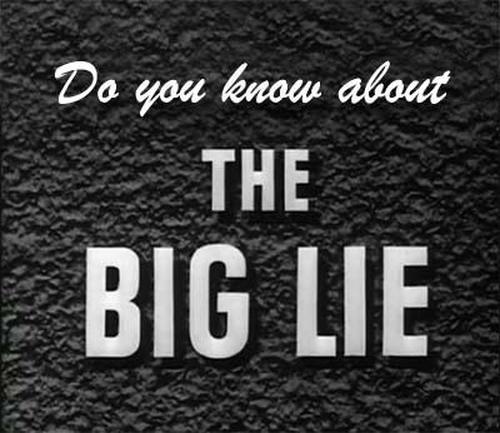
As this second impeachment farce plays out, and the nation is engrossed and entertained by bloviating cretins disguised as elected representatives, spewing white supremacy gibberish, confirming Mencken’s belief those we elect prove voters are as moronic as the imbeciles they elect, the real economy remains in a government mandated depression, foodbanks are overwhelmed, small businesses continue to be purposely destroyed by despot governors, while Big Corp and Big Tech prosper, thrive and vacuum up more wealth.
Nancy Pelosi and her team of diverse mouth breather swamp scum have now impeached Trump for a phone call about the truthful accusation that Joe Biden used undue influence to have a Ukrainian prosecutor investigating Hunter Biden’s blatant peddling of Biden influence for millions, and now for the incitement of an insurrection by giving a speech in which he told a crowd to peacefully protest an election racked by online computer vote switching schemes and counterfeit mail-in ballot fraud.
In both cases there was zero chance of Trump being convicted and in the current instance these feckless troglodytes spent a couple hours of vacuous race posturing before voting to impeach and would have to conduct a Senate trial after Trump has moved back to Florida. This is nothing but pure putrid politics in an attempt to make Republican politicians grovel and cower, while attempting to shame Trump voters into seclusion.
The cowardly RINOs showed their true colors by voting with Pelosi’s posse, led by neo-con establishment warmonger Liz Cheney. Within a week the FBI supposedly determined the “storming” (aka being let in by the police) of the Capital was coordinated and planned weeks before using Facebook groups and other social media means. That poses the question, how could Trump’s speech incite an insurrection that was already planned and being executed while he was still speaking? Is Facebook being shutdown for the good of the country?
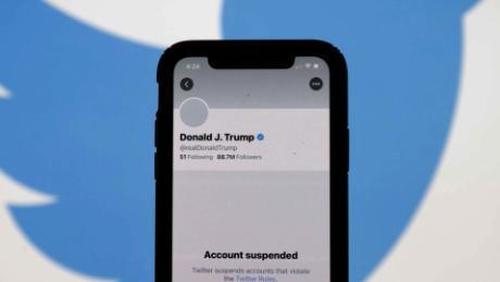
For over a week the Big Tech/Big Media/Big Gov oligarchs jammed the insurrection bullshit down our throats with their pontificating and painting of all Trump supporters as white supremacists conducting an armed uprising against our “noble” government swamp creatures slithering around the halls of congress. The FBI has done their part by hyperventilating about “potential” armed protests in every state capital on January 20. The FBI, along with CIA, DOJ, and military, have been in on the plot to unseat Trump before he took office, and they continue to do their part in the never-ending coup to discredit him and insure he can’t run again in 2024.
This is nothing but fearmongering to further discredit Trump supporters and force them to cancel themselves under the threat of being canceled by the woke leftist mob. The only armed attacks on state capitals would be planned, funded, and equipped by the FBI after convincing some dupe to go along with their plan, creating their needed false flag for gun confiscation or acting like they foiled their own plan at the last second to the accolades of the leftist media.

CNN and the rest of the fake news media, along with the mini-despots Dorsey, Zuckerberg, and Bezos, are doing their totalitarian censorship damnedest to bury the John Sullivan (BLM terrorist) and ANTIFA videos proving they provoked, initiated, and took part in the violence in the Capitol. CNN even interviewed this lowlife scumbag on air after the Capitol kerfuffle as if he was a journalist, rather than radical leftist criminal.
The First Amendment is so inconvenient for these tyrants and their communist cohorts – AOC and her squad of Maoists. Anyone not in agreement with their warped psychopathic narrative must be sent to re-education camps, and if that fails, to the gulag. This is the mindset of those now in control of all the levers of our government. Next, we will be segmented into districts and subjected to Hunger Games level subjugation and tyranny. They are not satisfied with beating Trump and his 75 million followers, they must re-educate and change them to achieve everlasting victory.

“We do not merely destroy our enemies; we change them.” ― George Orwell, 1984
The incomprehensibly cosmic degree of duplicitous hypocrisy from Pelosi, Schumer, their radical extremist brethren, and their lapdogs in the fake news media knows no bounds. As the terms “insurrection” and “armed revolt” are ejected from their pieholes like diarrhea after eating gas station sushi, these myopic deceitful weasels suffer from lack of self-awareness or willfully ignorant amnesia regarding the events of this past summer. CNN, MSNBC and the rest of the far-left media complex cheered on the riots, beatings of innocent bystanders, looting, burning of government buildings and police vehicles, assaults on police, destruction of small businesses, and skyrocketing murder rates, all in the name of social justice, because a couple felons and drug addicts died while resisting arrest.
The smarmy double standard applied when reporting actual violent uprisings by BLM and ANTIFA terrorists versus a Trump rally where 99% were peaceful and 1% were paid actors to incite violence, reveals the duplicity of these faux journalists. Trump always had them pegged perfectly with his “Fake News” moniker, and that accurate portrayal has driven them insane with rage to destroy him.
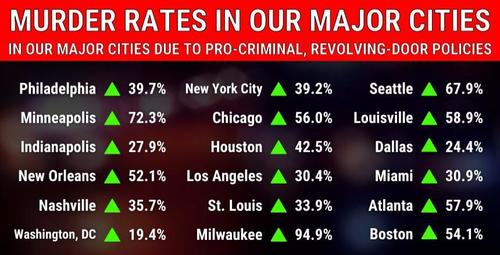
The Silicon Valley ministers of propaganda and censorship not only allowed these planned riots to be coordinated on their social platforms, but openly supported and encouraged the violence and mayhem. Burning downtown districts, police under siege, murder, and anarchy gripped dozens of Democrat run cities for months, but they were reported as fiery but mostly peaceful protests by the irresponsible media. Kamala and Hollywood elites bailed out killers and anarchists. Not a peep out of Pelosi, Schumer or basement Biden about insurrection, armed mobs, or violent revolt.
So, Twitter and Facebook allowed violent criminals to coordinate and carry out hundreds of uprisings and violent mob attacks attempting to overthrow the authorities in dozens of cities with zero consequences or moral outrage. Did Amazon shut down their servers? Normal law-abiding citizens of this country were provided a glimpse into a future controlled by Big Tech/Big Media/Big Democrat Gov and should have resisted this left-wing surge of anarchy. Instead they sat back and watched it on their boob tubes while passively accepting the lockdowns imposed by their governors. Now it is too late.
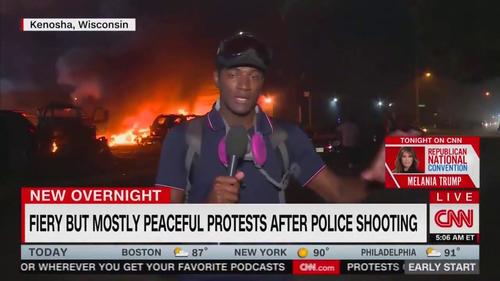
I realized the oligarchy no longer even feigned to believe in the rule of law or freedom of speech with the coordinated snuff film episode of Get Parler. This was a coordinated takedown of a website which was inconveniencing the Big Tech oligarchy of Twitter, Facebook, Google, Apple and Amazon. If ever a clearer example of anti-trust collusion was exhibited, this was it. But these amoral tyrants know they have sleepy Joe in their pocket because they went all in on the Hunter Biden laptop story suppression and pale face Zuckerberg “donated” $400 million towards helping swing state election officials commit fraud to guarantee a Biden victory.
The banning of Trump by Twitter and Facebook and the purge of those unwilling to go along with their Marxist ideological narrative caused hundreds of thousands to head for the exits towards Parler & Gab, where freedom of speech still existed. Freedom of speech is no longer allowed on Facebook, Twitter or Youtube.
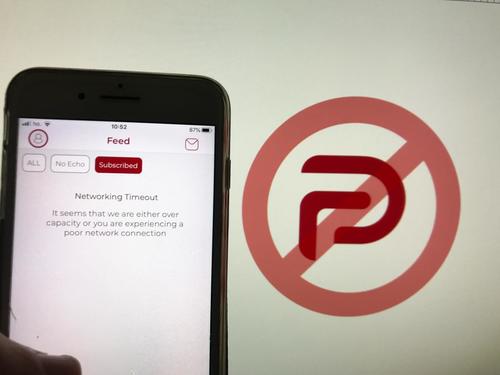
As conservatives flocked towards Parler, the Big Tech oligarchs pulled back the curtain to reveal the brick wall. They all simultaneously began peddling the provably false narrative the dreadful “assault on freedom”, with no weapons, at the Capital was solely coordinated and planned on Parler. It is absolutely provable and factual that any planning was done using Facebook private groups.
Parler and Twitter are where keyboard warriors fight verbal battles to the death, wearing sweatpants and scratching their asses in their basement. It is a battle for likes and followers. No insurgency is plotted on these platforms. Parler was on the verge of stealing millions of former Twitter users after they gave Trump the boot. Parler’s app was the number one downloaded app in the Apple store and Google store. So, they removed it. But people could just get there from their website. So, Amazon shutdown their servers. Parler users are now staring at a brick wall.
I’m reminded of the theater scene in the Tarantino movie Inglorious Bastards. The Trump supporters are now all classified as white supremacist nazis, so not only are the exits blocked by a brick wall, but Dorsey, Zuck, Bezos, Gates, Soros, Pelosi, AOC and Schumer want to set the theater on fire and machine gun the crowd. The incessant painting of all Trump voters as white trash racists is meant to dehumanize them in preparation for the retribution from the left-wing authoritarian fascists. They will use all means necessary to destroy those who do not bend the knee. Your rights, freedoms and liberties are inconsequential to these psychopaths.

The illusion of freedom has dissipated faster than a Biden cogent thought, as Jack Dorsey was secretly recorded declaring the silencing of Trump was just the beginning, with the cancellation of anyone with a dissenting viewpoint to follow. They no longer even pretend to be neutral or accepting of different perspectives or opinions. They now feel unleashed and can attack their enemies like rabid rottweilers as their pliable puppet president owes his illegitimate assumption of power to their propaganda and censorship schemes.
Controlling the presidency, the house, the senate, most of the biggest states, traditional media, social media, FBI, CIA, DOJ, and most of the major cities, has emboldened these totalitarian Marxists to seize this country by the throat and force their treacherous agenda upon a passive, docile, willfully ignorant public. You may not know it, but you are at war, and you are losing.
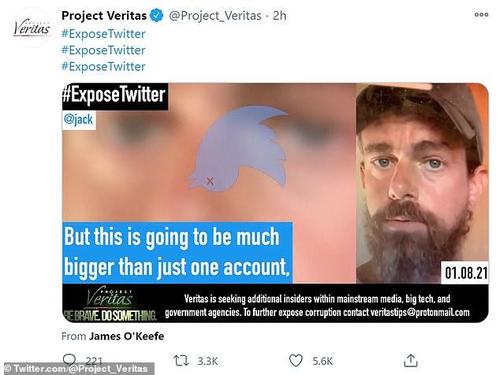
Just as they used 9/11 as the excuse to implement the pre-written 300 page (Biden written) Patriot Act to fight the War on Terrorism, they will use this faux insurrection as the excuse to implement an already pre-written 20,000 page domestic terrorism law to be used against the millions of “white supremacist” Trump supporters. Within weeks of the 9/11 attack, the Patriot Act ushered in the surveillance state, unleashing unaccountable conspirators like Brennan and Clapper to implement un-Constitutional Orwellian measures, recording every electronic communication of every American.
Until Snowden and Assange revealed the unlawful and deceitful actions of these traitors, this was all done in secret. The patriotic whistleblowers are now treated as criminals. Their banishment as traitors tells you how far this country has degenerated into a totalitarian dystopia. The world has gone mad, but we need millions to rise up with the courage to tell the truth. It starts with yourself.
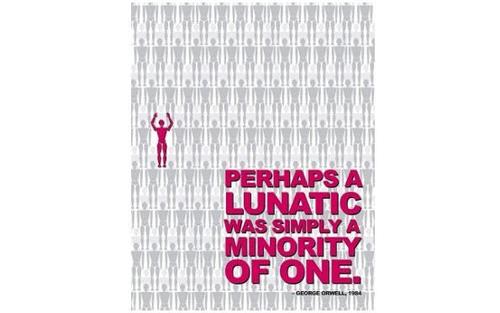
“Being in a minority, even in a minority of one, did not make you mad. There was truth and there was untruth, and if you clung to the truth even against the whole world, you were not mad.” ― George Orwell, 1984
Now that the Party has attained power through illicit means, they have no intention of ever relinquishing that power. They will solidify their control by overturning the filibuster in the senate, make Washington DC and Puerto Rico states, packing the Supreme Court with leftist judges, enacting MMT, centralizing control in the hands of the oligarchs and permanently installing their election fraud scheme in the necessary states. Big Tech will further crackdown and de-platform enemies of the state (aka conservatives and libertarians), while gladly providing their customers’ personal information to the state surveillance agencies, and either promoting the Party narrative or censoring the truth – for the good of the Party.

They will continue to use the China flu as a means to control the masses. Super mutant strains will be reported to keep the sheep docile and frightened. Masks will become a permanent fixture to dehumanize you and make you believe every stranger is a disease spreading parasite. They will require a vaccination passport to travel, attend sporting events, eat out, and work. The green new deal will be jammed down out throats at the point of a gun. Your guns will be outlawed and/or be made prohibitively expensive to buy or own.
These totalitarian Marxists have no interest in the betterment of humanity, the sanctity of the nuclear family, decency, common respect, community standards or the welfare of future generations. Our modern-day Room 101 doesn’t have rats ready to gnaw on your face, it has Covid-19 ready to attack your lungs and suffocate you. Orwell would be impressed by our current day Big Brothers (Gates, Zuckerberg, Bezos, Dorsey), as their means of control and fear is so much more efficient. Their revolution is about the acquisition of power for the sake of power. They have no qualms about being the boot stomping on your face forever. Know your enemy and subvertly start fighting now, or your fate will be sealed over the next decade.
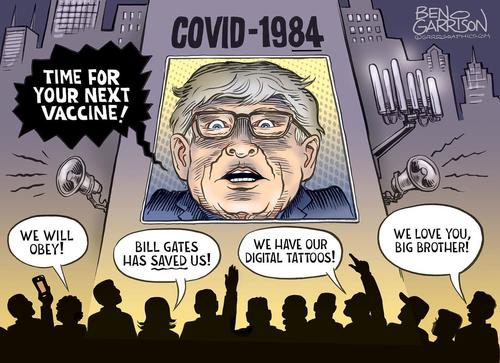
“Now I will tell you the answer to my question. It is this. The Party seeks power entirely for its own sake. We are not interested in the good of others; we are interested solely in power, pure power. What pure power means you will understand presently. We are different from the oligarchies of the past in that we know what we are doing. All the others, even those who resembled ourselves, were cowards and hypocrites. The German Nazis and the Russian Communists came very close to us in their methods, but they never had the courage to recognize their own motives.
They pretended, perhaps they even believed, that they had seized power unwillingly and for a limited time, and that just around the corner there lay a paradise where human beings would be free and equal. We are not like that. We know that no one ever seizes power with the intention of relinquishing it. Power is not a means; it is an end. One does not establish a dictatorship in order to safeguard a revolution; one makes the revolution in order to establish the dictatorship. The object of persecution is persecution. The object of torture is torture. The object of power is power. Now you begin to understand me.” ― George Orwell, 1984
* * *
The corrupt establishment will do anything to suppress sites like the Burning Platform from revealing the truth. The corporate media does this by demonetizing sites like mine by blackballing the site from advertising revenue. If you get value from this site, please keep it running with a donation.




 I did, before that, run into a guy named Eddie with a bunch of “Biden Is Not My President” t-shirts that he’d been hoping to hawk to the marchers. Another t-shirt salesman, who had driven down from Pittsburgh, said he’d been under the impression that this was going to be a Second Amendment march, not a stop-the-steal march. (He might do better tomorrow in Richmond, Virginia, where he plans to set up shop among the gun-rights activists in town for
I did, before that, run into a guy named Eddie with a bunch of “Biden Is Not My President” t-shirts that he’d been hoping to hawk to the marchers. Another t-shirt salesman, who had driven down from Pittsburgh, said he’d been under the impression that this was going to be a Second Amendment march, not a stop-the-steal march. (He might do better tomorrow in Richmond, Virginia, where he plans to set up shop among the gun-rights activists in town for 